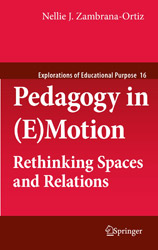Pedagogy in (E)Motion: Rethinking Spaces and Relations
Julian McDougall, University of Wolverhampton
Zambrana-Ortiz, N. J. (2011), Springer. .......... We can be forgiven for feeling misled by the title, as this book is not concerned with e-learning or digital literacy or any other aspect of ‘new media’ in relation to education. The play on words with (e) motion relates to emotion and transformation / hope. Zambrana-Ortiz sets out a ‘pedagogy of the emotion’ and uses ‘street pedagogy’ as a te...

Author: Nellie J. Zambrana-Ortiz
Publisher: Springer
Publication date: 2011
ISBN: 978-94-007-0664-4
Price: £90.00 (hardcover)
We can be forgiven for feeling misled by the title, as this book is not concerned with e-learning or digital literacy or any other aspect of ‘new media’ in relation to education. The play on words with (e) motion relates to emotion and transformation / hope. Zambrana-Ortiz sets out a ‘pedagogy of the emotion’ and uses ‘street pedagogy’ as a template for all learning and teaching. The rethinking of spaces and relations is, then, nothing to do with the internet, as we might have expected. Instead this is a highly political thesis, concerned with struggle and colonialist oppression and highly charged with personal experience of both. In this highly charged sense, it is as far away from the NSS and QA audits as I can imagine and, certainly, it is politically and emotionally irresistible.
As educators, our work is situated here within a broader ‘ecology’ for solidarity as an axis for humanization. As such we are given a timely and affirming reappraisal of why we go to work and, in the UK context, such an emancipatory ‘shot in the arm’ is much needed in these ‘difficult times’. However, I’m sad to say that this ‘high ground’ in intention and spirit cannot compensate for the many significant problems with the detail.
The structure of this book is off-putting and dense. Each chapter is made up of something like twenty sub-sections, often only a page or less in length and this has a ‘scattergun’ effect on the reader – akin to a text-heavy ‘death by Powerpoint’ experience. The chapters are fascinating and politically compelling throughout, but too often the moral conviction cannot disguise a lack of coherence in connecting agency to structure.
In a chapter connecting Freire and Vygotsky in a celebration of ‘street pedagogy’, we are provided with a wealth of vignettes – teachers’ strikes as a context for ‘authentic learning’, activism against US military actions in Puerto Rica and a spontaneous pedagogic dialogue in a beauty parlour arising from the need to mend a broken nail, taking in the death penalty and the roles of women. The argument here is that emotion, context and hope are vital ingredients of ‘street pedagogy’ and that the ideas of both these theorists can only be adequately manifested in education with attention to struggle and disadvantage. A more ‘applicable’ chapter, perhaps, is the essay on ‘Artscience’, again taking Vygotsky’s work, in this case to formulate a strategy for recognising the ‘hermeneutical value of the emotional dimension of thinking and performance and the intentional fusion of science and arts’ – here, a pedagogy which refuses to set apart art and science as polarised languages is constructed as an ‘attitude’. Post-structuralist work on discourse and language games / gaming are only cited through reference to Freire’s position. This creates the unconvincing impression of this author being the originator of a range of radical and original ideas, drawn together from prolific references to an amazing wealth of sources. So when we are offered the view that teaching should never be about recourse to universals, rules or absolutes, but should be instead about responding with creativity and with affinity to the unexpected, uncontrolled variables and shifting contexts, the lack of any substantial discussion of postmodern educational research / theory is rather glaring. Ultimately, it’s very difficult to unravel a connecting theory or strategy for practice / praxis from this and the text is as a result very frustrating in this regard. It remains almost entirely rhetorical – it is hard to argue against any of it, but it fails to construct a lucid thread to weave together the myriad of scenarios, assertions, observations and political compulsions. It is very much like a (very long) keynote speech contextualising an over-arching idea in a multitude of anecdotes and examples. Politically, this passionate call for pedagogy that hinges on emotion and action against oppression cannot be contested. But unlike a keynote, a sustained text such as this cannot charm us into conviction – almost every page oscillates between huge generalising assertions and ‘micro’ events from the author’s experience and the relationship between the two is often loaded with assumption.
The chapters that work through pedagogy arising from political struggle and colonialism in Puerto Rica clearly connect human rights activism with a pedagogy of solidarity. These are rich, fascinating accounts of the fundamental ‘cause’ of education for marginalised and oppressed people. Interviews with victims of, and campaigners against, colonialist oppression are woven into the material. Pedagogy, here, is to lift the human spirit. And there is no way that a review for this journal can pass adequate judgment on this. The author has re-constructed Freire’s radical pedagogy in the context of her own political experience with struggle as ‘the only real freedom’. Politically, this should be essential reading for all institutionalised, instrumental. ‘jobbing’ teachers in Gove’s Britain, me included. But the dilemma presented is that the weaving together of the personal and the public is insufficiently grounded and we must review academic argument with the strictest of criteria, however we value the cause. From the outset, Freire’s work on the interplay of emotion and cognitive development frames this work and the arising metaphor of educator as performer is the subject of many of the personal experiences (of her own moving pedagogy) that the author cites. Pedagogy in (E) motion sets out to extend this field, and also the work of bell hooks and other advocates of post-colonial education. It succeeds at the broad level of mapping out a political model that is positively and abundantly ‘other’ to so much of what we do in our daily work. But at times, and in key places, it fails to take us to a safe place from where we can begin the work.
Reviewer
Julian McDougall is Reader in Education, University of Wolverhampton.


